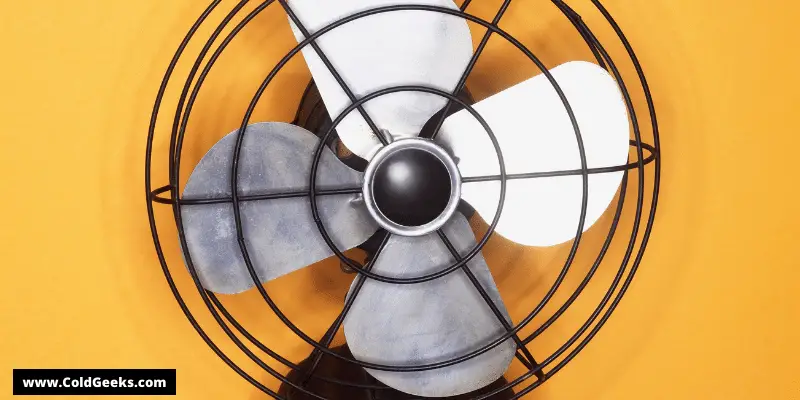Fans come with giant, sharp blades that spin at high speeds, so it’s only natural that you’d wonder if they are dangerous.
Can fans hurt you?
Fans can hurt you. Fans can fall on you, overheat, cause fires, and even explode. Fans circulate dry air that can cause irritation and pain throughout your body. Most fans consist of several fast-spinning blades sharp enough to cut or bruise you. Safety is important around any fan.
Here are 17 things you need to know about the danger of fans.
Does Sleeping With a Fan on Hurt You?

Many people complain of aches and pains after sleeping all night with fans on.
Can sleeping with a fan on hurt you?
Yes, sleeping with a fan on can hurt you. When your body is exposed to circulating dry air all night, your muscles can become tense and cause all sorts of pain.
Sleeping with a fan on can hurt your:
- Face
- Eyes
- Ears
- Back
- Neck
- Legs
- Shoulders
- Arms
- Hands
- Chest
Can Fans Make You Sick?
Fans do not usually make you sick.
Leaving a fan blowing on you for extended periods of time might make your existing problems worse.
When fans circulate air in a room, it creates dryer air that can affect your throat, mouth, or nose.
This can lead to issues such as:
- Snoring
- Breathing problems
- Sore throat
- Headache
- Congestion
- Allergy problems
- Aching muscles
- Coughing
- Dehydration
Sleeping with a fan on does not cause pneumonia. Most fans simply do not blow cold enough air.
Can a Fan Paralyze Your Face?
No, a fan can not paralyze your face or any other part of your body.
If you leave a fan blowing on you long enough, you might experience muscle aches, spasms, and pain.
Circulating cold air can make your muscles tighten, even while you sleep.
However, this is not paralysis.
Can Fans Hurt Your Hearing?
Long-term exposure to cool, circulating air can dry out your ear canals, trigger allergies, cause itching, and lead to other discomforts.
Therefore, a fan might help create the conditions for an ear infection.
Or, a fan might make an existing ear infection worse.
A very severe ear infection might damage your ear and hurt your hearing.
Supremely loud fans close to your ears might also damage your hearing.
Can Fans Hurt Your Eyes?
Fans can circulate dry air and kick up allergies in the room that may hurt your eyes.
If you lay facing a fan, the cold air might cause pain in your eye muscles.
Dust and other pollutants can also irritate your eyes.
Yet, it is highly unlikely for a fan to cause vision loss or other serious, long-term eye problems.
Can Fans Cut You?
Yes, fans can cut you.
The blades of many fans are sharp enough to cut into your skin if you accidentally get too close.
Fans with strong blades, such as ceiling fans and those with propeller-like blades, can cause serious injuries if they strike you.
Even small fans pose a danger because of their blades.
Can Plastic Fans Cut You?
If plastic fan blades are spinning fast enough, they can cut you.
Even if the fan does not penetrate your skin, it can still damage your tissue or leave serious bruises.
I recommend using extreme caution around any fast-moving fans.
However, even slow-moving plastic fans pose a potential risk.
Can a Fan Cut Your Head Off?
Most residential fans are not strong enough (nor do they usually spin fast enough) to decapitate a human being.
However, that does not mean there is no threat.
A fan can still deliver a fast and hard strike to your head or neck, leaving you with a nasty bruise or concussion.
In extreme cases, you might suffer brain damage.
Thankfully, many fans are built with protective “cages” or positioned out of reach to prevent injuries.
Industrial or large military-grade fans can decapitate you.
Can a Metal Fan Cut Your Finger Off?
Yes, a metal fan can cut off your finger.
If you accidentally put your finger too close to the metal blades, they can cause you serious harm.
For example, if your blade guard is damaged and you lean into the fan, your finger can get cut off.
When a fan starts up, it can also send small metal pieces of its motor flying through the air. If those pieces strike your skin, they might cause a deep cut.
I remember when one of my kids almost lost a few fingers playing close to a fan in my garage.
It was terrifying.
If you work around fans long enough, you learn that almost anything can happen.
Can a Box Fan Cut Your Finger Off?
A box fan can cut your finger off.
Some box fan blades turn too slowly to sever a finger, but they can still hurt you.
Other, more powerful, box fans can definitely take off your finger, so please be cautious.
Can Fan Blades Kill You?
Fan blades can kill you.
While you are probably not in danger from most small or medium fans, some fan blades can be fatal.
The most dangerous fan blades are:
- Large
- Strong
- Moving at high speeds
Therefore, fast and metal fan blades without blade guards are some of the most dangerous fans.
Can a Ceiling Fan Kill You?
Yes, a ceiling fan could theoretically kill you.
However, unless your ceiling fan is improperly installed, you don’t need to worry.
The risk of dying by a ceiling fan is very low.
In fact, of the 19, 700 people injured every year by ceiling fans, only 4.5 die.
It’s terrible when anyone loses a life.
However, when looking at the risk purely by percentage, you are unlikely to ever experience even an injury.
Can a Ceiling Fan Cut Your Head Off?
A ceiling fan could decapitate you.
However, most ceilings fans spin too slow and are not strong enough. Yet, as we’ve mentioned previously, fans can still inflict serious harm to your neck and head.
Here is a really interesting 5-minute video where a guy tests how dangerous ceiling fans really are:
YouTube video by President Chay—Can fans hurt you?
Can You Die If a Ceiling Fan Falls On You?
Absolutely. You can die if a ceiling fan falls on you.
A ceiling fan is a heavy piece of equipment with sharp blades. It can injure you if it somehow becomes dislodged from the ceiling.
Bigger, heavier fans can do even more damage, even be fatal.
The height of the ceiling also matters. The taller the ceiling, the more momentum in the falling fan—and the more damage it will inflict.
The good thing is that a ceiling fan falling on you is very rare.
Can You Burn Yourself On a Fan?
You can burn yourself if you touch a very hot fan.
Some fans, especially older models, get very hot when used for a long time at high speeds.
Small, household fans and large, industrial fans can both become very hot. If you touch one of these hot fans, it could burn your skin.
Can a Fan Catch on Fire?
Yes, a fan can overheat and catch on fire.
Some older metal fans are more likely to overheat, but new designs are much safer.
The usual culprits are malfunctioning cords, motors, wires, or switches.
If your fan does catch on fire, turn it off immediately. Use a fire extinguisher or baking soda to smother the flames and prevent them from spreading.
If necessary, call the authorities (911 in the United States).
Can Attic Fans Cause Fires?
Yes, attic fans can cause fires.
Attic fans typically lead to fires when they are installed and forgotten. Like any other appliance, they require occasional check-ups and repair.
Left unrepaired, attic fans can malfunction and catch on fire.
Even if the fan itself doesn’t cause a fire, it can make a fire worse.
Can Electric Fans Catch on Fire?
Electric fans can catch on fire and cause fires.
If a fan is on a lot, it can break.
If you run a fan too much, the ball bearings inside might malfunction. This could cause the motor to get hot and start a fire.
Dust and lint might get caught in your fan and could start a fire if you don’t clean it out often.
If you use a high-powered fan for a long time, there is even more risk of a fire.
When not in use, unplug your electric fan and store it somewhere safe and dry so it doesn’t get damaged.
Can You Get Electrocuted by a Fan?
Yes, you could get electrocuted by a fan.
It probably won’t happen if the fan is unplugged or turned off, but you can get shocked by a fan.
Even if you do get a shock, it’s unlikely to seriously harm you.
However, Consumer Products Safety Commission estimates that 16 people die from electrocution by fans every year.
Typically, you will only get shocked when:
- Installing a fan
- Repairing a fan
- Touching an internal wire
- Touching a ceiling fan pull chain
- There is no ground wire
- The ground wire was interrupted or disconnected
If you see someone getting electrocuted, don’t make physical contact or you could end up getting shocked, too.
Instead, turn the power off and try to break contact between the person and the fan using an insulator.
Plastic, wood, or rubber make good insulators.
Can a Fan Explode?
It’s not likely but, yes, fans can explode.
A fan motor can get so hot that it catches on fire. If the fire is not put out, it can engulf the fan and cause an explosion. If a large and powerful charge is directed at a fan, it could theoretically explode.
You increase the likelihood of an explosion by:
- Leaving the fan on for long periods of time
- Not ensuring that the fan is working properly
- Installing or repairing a fan without proper knowledge
- Using very old fans designed without modern safety features
Final Thoughts: How To Stay Safe Around a Fan
Despite all of the potential dangers, there are simple ways to prevent accidents from occurring around an easily-accessible fan.
The primary way to stay safe near a potentially dangerous fan is to keep your hands, hair, or clothing away from its blades.
There are also several ways to reduce the likelihood of being struck by a fan if you have access to one.
The most obvious way is to turn off the power before touching the fan, but it is possible for fans to turn on without warning.
Another option is to install a fan guard.
A fan guard is a safety cover that can be placed on top of or around the blades and prevents anything from touching them.
A final way to stay safe near a fan is to simply put it out of reach, such as hanging your fan from the ceiling or high on a wall.
What to read next:
- Can I Throw a Fan in the Trash? (Helpful Advice)
- How Do Remote Control Fans Work? (SOLVED)
- What Does Ion Mean On a Fan? (Explained for Beginners)
